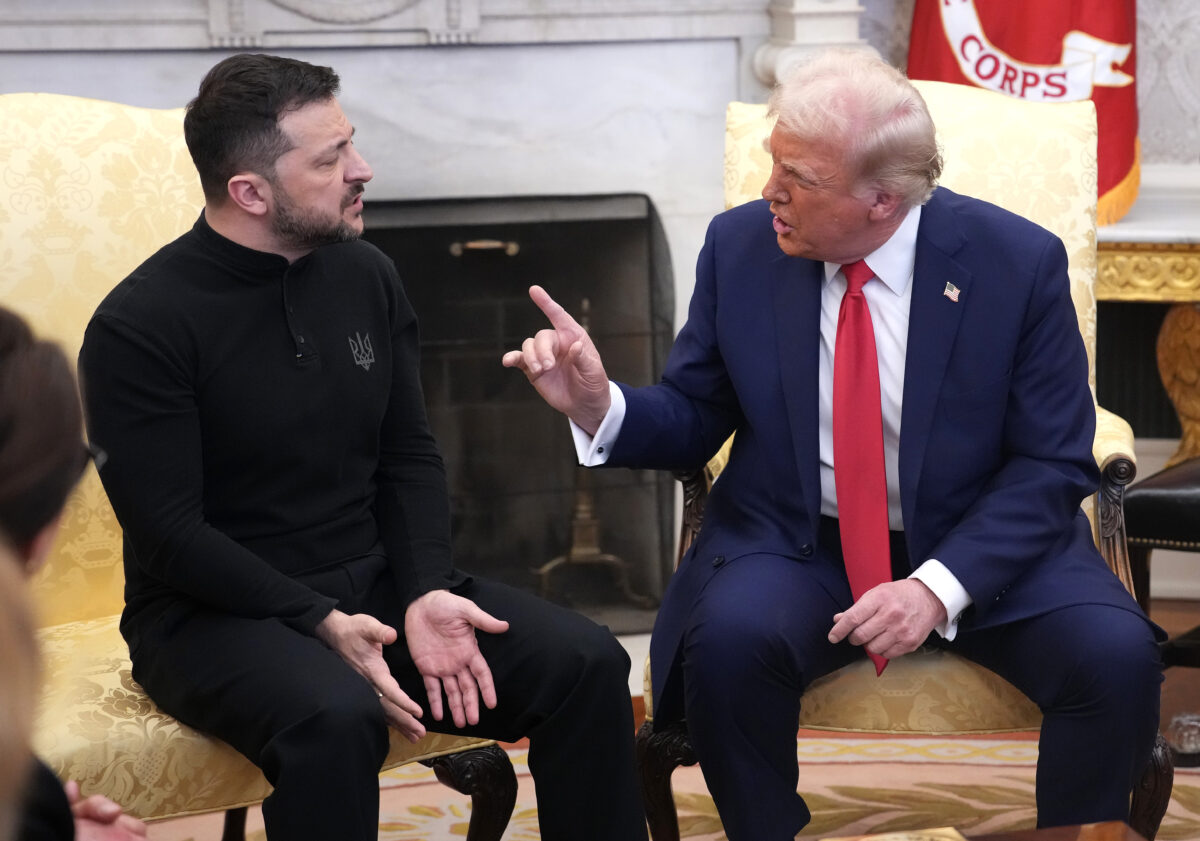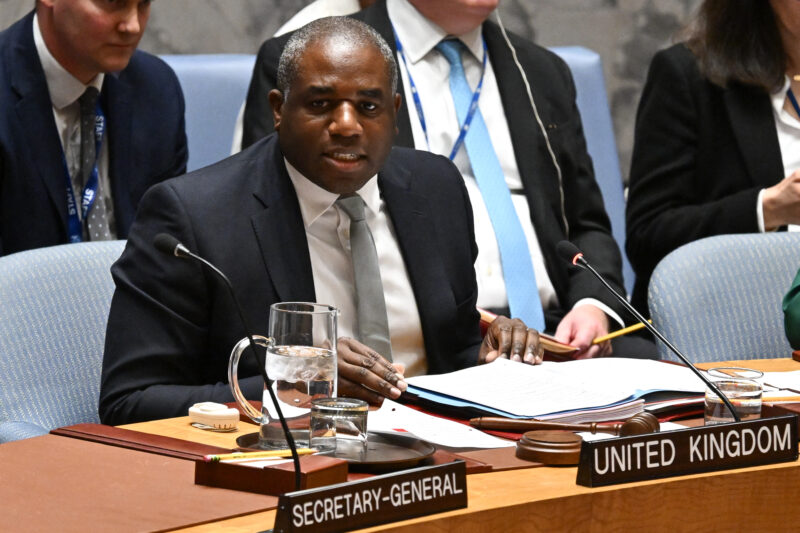
Daily Kickoff: After Zelensky’s Oval spat, Bibi offers Trump his own thanks
Good Monday morning.
In today’s Daily Kickoff, we report on the status of the hostage-release and cease-fire talks between Israel and Hamas after the first phase of the agreement ended this past weekend, explore how the U.S.’ new stance on Ukraine is seen in Israel, and talk to U.S. lawmakers about their insights into Israel’s military plans after they met with leaders in Jerusalem. We also cover past comments from Elbridge Colby about a potential strike against Iran, and speak to Jersey City Mayor Steve Fulop amid scrutiny from the New Jersey Jewish community towards his gubernatorial run. Also in today’s Daily Kickoff: Tamar Ish Shalom, Andrew Cuomo and Deborah Lipstadt.
What We’re Watching
- The Anti-Defamation League’s Never Is Now summit kicks off today in New York. We’ll be on the ground at the Javits Center covering the two-day confab’s sessions and speakers. This morning at the opening plenary, the organization’s CEO, Jonathan Greenblatt, will deliver a speech, as well as Rep. Elise Stefanik.
- Israel said it stopped the flow of goods and supplies into the Gaza Strip after the 42-day cease-fire deal expired on Saturday night. More below.
What You Should Know
After another U.S. ally was attacked for not being “thankful” enough for the American military, diplomatic and financial support that it needs in order to continue conducting an extended war, Israeli Prime Minister Benjamin Netanyahu expressed his gratitude to President Donald Trump “for his unwavering support,” in a video message posted on Sunday evening.
Netanyahu’s reassertion of Israel’s close ties to the White House comes after the temporary cease-fire deal in the first phase of the agreement between Israel and Hamas expired, and — amid a lack of progress in the negotiations — Israel’s decision to stop the flow of humanitarian aid into the Gaza Strip, pointing to Hamas’ theft of the supplies. Israel has been trying to extend the first phase of the agreement, rather than move on to the second phase, which requires a full Israeli withdrawal from Gaza — a nonstarter for parts of the Israeli government.
“Israel has accepted President Trump’s envoy Steve Witkoff’s plan to extend the temporary cease-fire by 50 days, during that time we can discuss the conditions for a permanent cease-fire that will end the war in Gaza,” Netanyahu said. “In Witkoff’s plan, half of the hostages would be released right away and the remaining half would be released if we reach an agreement on a permanent cease-fire.”
“Again, Israel has accepted this plan. I accepted this plan. But so far, Hamas has rejected it. Hamas had also put forward positions for a permanent cease-fire that are totally unacceptable,” Netanyahu added. The time frame of the plan that Israel attributed to Witkoff spans the Muslim holy month of Ramadan, which began on Friday night, and the Jewish holiday of Passover in April.
The White House backed Israel’s decision to withhold aid, with National Security Council spokesperson Brian Hughes saying yesterday, “Israel has negotiated in good faith since the beginning of this administration to ensure the release of hostages held captive by Hamas terrorists. We will support their decision on next steps given Hamas had indicated it’s no longer interested in a negotiated cease-fire.”
Whether or not cease-fire talks progress to the second stage will be the Trump administration’s first solo test on Israel. The first stage of the cease-fire was inked in the final days of the Biden administration.
But as the cease-fire negotiations remain up in the air and the fates of the remaining 59 hostages remain in limbo, all eyes in Washington are on what Trump will say in his Tuesday prime-time address to Congress, which is expected to cover both Israel and Ukraine.
Trump is expected to meet earlier Tuesday with released hostages, Eli Sharabi, Doron Steinbrecher, Iair Horn, Keith and Aviva Siegel, and Omer Shem Tov. “Government officials will hear about the urgency of returning all hostages immediately and in a single phase,” the Hostages Families Forum said in a statement.
The White House’s differing approaches to two U.S. alliesunder threat will be put on display during his Capitol Hill address, which comes days after Trump and Vice President J.D. Vance clashed with Ukrainian President Volodymyr Zelensky in front of reporters on Friday.
But while Trump has indicated he may withhold U.S. aid to Ukraine, the administration is moving forward on a series of arms sales to Israel totaling nearly $4 billion. Secretary of State Marco Rubio announced that he had invoked “emergency authorities” to bypass Congress and deliver the aid, which includes 2,000-pound bombs blocked by the Biden administration.
The lesson is clear: Playing to Trump’s penchant for praise pays off — a lesson learned long ago by the Israelis. Former Israeli Ambassador to the U.S. Michael Oren suggested that in his combative approach to Trump, Zelensky “supplied a textbook example of how not to handle a foreign leader of formidable pride and breakaway policies.”
How either war reaches its conclusion remains an open question. But Trump’s address tomorrow will give his clearest indications yet of how he hopes they will end.
jerusalem jitters
Washington’s U-turn on Ukraine a ‘challenge’ for Israel, experts say

The almost 180-degree shift on Ukraine from the Biden to Trump administrations — from vocal support and a flow of weapons to the threat of a halt of arms shipments and a call to abruptly end the war without security guarantees — is almost a mirror image of the change in Washington when it comes to Israel. Under Biden, there were freezes on some weapons and a cease-fire plan that would keep Hamas in power, and now $4 billion in arms were approved and the White House supports Israel blocking aid to Gaza. Yet, after President Donald Trump’s confrontation with Ukrainian President Volodymyr Zelensky last week, some experts are warning that the implosion of ties between Washington and Kyiv could have ramifications for Israel, Jewish Insider’s Lahav Harkov reports.
‘No holy cows’: According to Chatham House senior fellow and former Knesset member Ksenia Svetlova, “what happened in the White House with Zelensky shows that the U.S. doesn’t have a constant policy or permanent allies. If there are no permanent allies, if Ukraine is thrown into the trash after all these years … no one is immune.” According to Svetlova, the fact that the Biden administration froze some weapon shipments to Israel amid domestic political pressure shows that “there are no holy cows, not even Israel.”




















































































